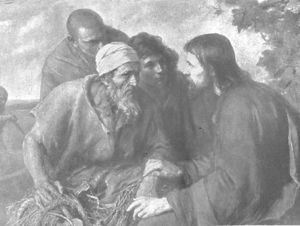Ecclesiastes 8
 |
| Comments |
| Questions |
| [[1]] |
Keep the King's Command
1 Who is as the wise man? and who knoweth the interpretation of a thing? a man's wisdom maketh his face to shine[1], and the boldness of his face shall be changed.
2 I counsel thee to keep the king's commandment, and that in regard of the oath of God.
3 Be not hasty to go out of his sight: stand not in an evil thing; for he doeth whatsoever pleaseth him.
4 Where the word of a king is, there is power: and who may say unto him, What doest thou?
5 Whoso keepeth the commandment shall feel no evil thing: and a wise man's heart discerneth both time and judgment.
6 Because to every purpose there is time and judgment, therefore the misery of man is great upon him.
7 For he knoweth not that which shall be: for who can tell him when it shall be?
8 There is no man that hath power over the spirit to retain the spirit; neither hath he power in the day of death: and there is no discharge in that war; neither shall wickedness deliver those that are given to it.
9 All this have I seen, and applied my heart unto every work that is done under the sun: there is a time wherein one man ruleth over another to his own hurt.
Those Who Fear God Will Do Well
10 And so I saw the wicked buried, who had come and gone from the place of the holy, and they were forgotten in the city where they had so done: this is also vanity.
11 Because sentence against an evil work is not executed speedily, therefore the heart of the sons of men is fully set in them to do evil.
12 Though a sinner do evil an hundred times, and his days be prolonged, yet surely I know that it shall be well with them that fear God, which fear before him:
13 But it shall not be well with the wicked, neither shall he prolong his days, which are as a shadow; because he feareth not before God.
Man Cannot Know God's Ways
14 There is a vanity which is done upon the earth; that there be just men, unto whom it happeneth according to the work of the wicked; again, there be wicked men, to whom it happeneth according to the work of the righteous: I said that this also is vanity.
15 Then I commended mirth, because a man hath no better thing under the sun, than to eat, and to drink, and to be merry: for that shall abide with him of his labour the days of his life, which God giveth him under the sun.
16 When I applied mine heart to know wisdom, and to see the business that is done upon the earth: (for also there is that neither day nor night seeth sleep with his eyes:)
17 Then I beheld all the work of God, that a man cannot find out the work that is done under the sun: because though a man labour to seek it out, yet he shall not find it; yea further; though a wise man think to know it, yet shall he not be able to find it.
Ecclesiastes | Ecclesiastes 1 | Ecclesiastes 2 | Ecclesiastes 3 | Ecclesiastes 4 | Ecclesiastes 5 | Ecclesiastes 6 | Ecclesiastes 7 | Ecclesiastes 8 | Ecclesiastes 9 | Ecclesiastes 10 | Ecclesiastes 11 | Ecclesiastes 12
Preceded by: Proverbs - Followed by: Song of Songs
Audio and Video Archives
2024 |
2023 |
2022 |
2021 |
2020 |
2019 |
2018 |
2017 |
2016 |
2015 |
2014 |
2013 |
2012 |
2011 |
2010 |
Misc |
AllAud |
Broadcasts |
Books |
Bible |
Videos |
YouTube
Keys of the Kingdom Audio Archive
Bible |
Bible Index |
Bible References |
Biblical bunch |
Sophistry |
Modern Christians |
Whosoever believeth |
Religion |
Bible_terms |
Early non Bible authors
Athenagoras of Athens | Methodius of Olympus | Theophilus or Ignatius of Antioch
Hippolytus of Rome | Justin the Martyr | Jerome | Augustine of Hippo |
Epistle of Mathetes | Gospel of James | The Gospel of Thomas |
Philo Judaeus or Philo of Alexandria and The Allegories of the Sacred Laws
Polybius | Plutarch | Seneca | Tacitus | Suetonius |
Marcus Tullius Cicero | Celsus | Diotrephes |
People in the Bible
Paul the Apostle |
Melchizedek |
Moses |
Cain |
Caesar |
Herod |
Jesus |
John the Baptist |
Matthew |
Mark |
Luke |
John |
Nimrod |
Abraham |
Essenes |
Pharisees |
Sadducees |
Zealots |
Julius Caesar | Augustus Caesar | Tiberius | Nero |
Historical People
Buddha |
Constantine |
Eusebius |
Ambrose |
Augustine of Canterbury |
Lady Godiva |
Vespian |
Diocletian |
Manichaeism |
John Wycliffe |
- ↑ 0215 ^רוא^ ‘owr \@ore\@ a primitive root; v; AV-light 19, shine 14, enlighten 5, break of day 1, fire 1, give 1, glorious 1, kindle 1; 43
- 1) to be or become light, shine
- 1a) (Qal)
- 1a1) to become light (day)
- 1a2) to shine (of the sun)
- 1a3) to become bright
- 1b) (Niphal)
- 1b1) to be illuminated
- 1b2) to become lighted up
- 1c) (Hiphil)
- 1c1) to give light, shine (of sun, moon, and stars)
- 1c2) to illumine, light up, cause to shine, shine
- 1c3) to kindle, light (candle, wood)
- 1c4) lighten (of the eyes, his law, etc)
- 1c5) to make shine (of the face)
- 1a) (Qal)
- 1) to be or become light, shine